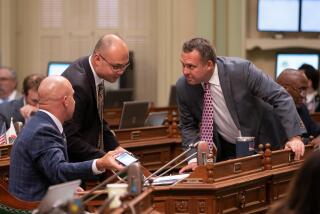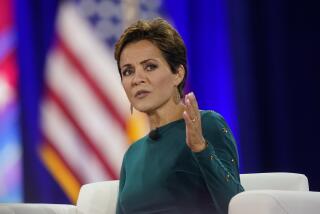Cranston Goes on the Offensive : Politics: The senator changes his tactics and attacks his chief accuser in the Lincoln Savings & Loan scandal.
- Share via
Protesting his innocence and proclaiming his good intentions have not succeeded in clearing his name. And neither has lying low, waiting for the storm clouds of scandal to blow over. So reelection-minded U.S. Sen. Alan Cranston changed his tactics Wednesday and hurled a fuming broadside against his prime tormentor--former federal bank board chief Edwin J. Gray.
“A publicity-hungry political hack . . . Gray lies . . . lies over and over in the Hitlerian technique of the Big Lie,” Cranston said.
This was the opening, and certainly the most lively, move in yet another attempt by the beleaguered Cranston to save his political future from the angry backlash over Lincoln Savings & Loan’s collapse.
Cranston said that as his new political offensive develops in the days ahead, he will offer something to try to help those 23,000 or so Californians who lost their savings when they bought uninsured bonds at Lincoln branches. Details will come soon, he said.
His goal is to redefine just what the fuss is all about with Lincoln, its chairman, Charles Keating, and California’s senior senator in America’s most expensive--$2 billion--S&L; failure.
Don’t blame me, Cranston said at his Wednesday press conferences in Los Angeles, San Francisco and Sacramento. Blame Ed Gray, the senator said.
“Gray was the man in charge when savings and loan institutions throughout the nation were heading into disaster, and he shares responsibility for a scandal that will probably cost taxpayers upward of $250 billion,” Cranston said.
So far in the long-running debate over his role in Lincoln’s crash, Cranston and four other U.S. senators have shouldered plenty of the blame. The five accepted Keating’s generous political contributions and then went to federal regulators on Keating’s behalf in the midst of a federal investigation of Lincoln. Cranston accepted more than any of them--$850,000 in contributions for three voter registration groups and $47,000 in direct contributions.
The rub comes in what Cranston and the other senators did when they intervened for Keating at a pair of meetings in April, 1987.
Cranston has repeatedly said he did nothing more than prod the Federal Home Loan Bank Board under Gray to speed up a long-running audit of Lincoln. This is the kind of help he gives constituents and California businesses regardless of whether they are contributors, Cranston insisted.
Gray, however, charged that Cranston and the other senators joined in pressuring him to withdraw a regulation restricting how much an S&L; could invest in things like junk bonds and real estate developments rather than home mortgages. The regulation was opposed by Keating. And instead of a routine inquiry by senators on behalf of constituents, Gray has called the episode tense and awkward and altogether extraordinary.
The Senate Ethics Committee is now reviewing the case.
Politics-minded Californians are keenly aware, though, that Cranston’s helping hand for Keating has grown into a larger and stickier image problem for the venerable senator, long the champion of the “little guy.” Now, he stands accused of having helped a “big guy,” a big contributor, in a sequence of events that ended up costing many ordinary Californians their savings and their jobs.
Cranston bored in Wednesday on the narrower issues of how he disagreed with Gray’s version of their encounters and select events, casting the matter as a debate between two politicians--a test of credibility between Cranston and Gray, a Democrat vs. a Republican, a senator against a former press aide to Ronald Reagan. In short, an old-fashioned political spat.
“This investigation is basically premised on the falsehoods of one Ed Gray. When it becomes clear that he is not a man to be relied upon in word or in deed, I expect that the charges against myself, (and Sens.) John Glenn, John McCain, Dennis DeConcini and Don Riegle will be looked upon in a very different light,” Cranston said.
“Gray is a public relations expert by profession. He knows he can tell just about any kind of lie about a politician these days and be believed--especially if he repeats those lies over and over in the Hitlerian technique of the Big Lie.”
Gray, who is now a Florida savings and loan executive, was on vacation, reportedly out of the country, and could not be reached for comment.
In his broadside, Cranston blamed Gray for six “lies” that have misshapen public perceptions about the events.
Cranston said it is a “lie” that he pressured Gray. Gray has said he felt pressured.
The senator said it is a “lie” that meeting with senators was anything but routine. “Gray preverts that meeting, making it sound like a sinister cabal,” said Cranston. Indeed, Gray does. “I felt a tenseness in the air, an awkwardness that was overwhelming. Just me and five senators in a room. Nobody else to record what was said,” he has said.
Cranston said it is a “lie” that his intervention delayed federal regulators in acting. Among those who have made this suggestion is House Banking Committee Chairman Henry Gonzalez (D-Tex.).
Cranston said it was a “lie” when Gray allegedly told an interviewer that the $850,000 in Keating contributions were to help Cranston get reelected. Actually, the contributions were for voter registration drives during the 1988 presidential race, not Cranston’s 1986 reelection. Gray reportedly described the voter registration groups as “phony,” which Cranston said was another “lie.”
The senator plans to spend this week and next trying to regain the offensive and to discourage a growing number of fellow Democrats who are stepping all over each other--half a dozen or more of them--to test the idea of running against him in the 1992 senate primary. Cranston accused them of “ghoulishness.”
One of the keys to his plan apparently is to offer help of some sort for those Californians who bought bonds at Lincoln branches. Many of the buyers now say they believed the bonds were backed by government deposit insurance. They were not, and are now without value.
“When the facts get known to them, and when it becomes apparent to the bond holders what I have sought to do, and am seeking to do, and am about to do more for them than any other single person, expect perhaps the attorneys representing them, I think their attitudes will change,” Cranston said.
Polls in the state show a profound plunge in Cranston’s popularity ever since his role in Lincoln was disclosed. But he gave no quarter Wednesday, after two weeks on vacation to brood over it.
“I come before you bloodied but unbowed,” he declared. “I assure you I have just begun to fight.”
And then the 75-year-old Cranston told a fable. It was about three elderly gentlemen who were talking about where they would like to be buried. One wanted to be buried next to Cleopatra. Another said he wanted to be buried next to Marilyn Monroe. The third said he wanted a plot beside Elizabeth Taylor.
“ ‘But wait a minute,’ the others shouted. ‘She’s not dead yet,’ ” Cranston continued. “ ‘Neither am I, the third one said.’ ”
Times staff writer Sara Fritz in Washington contributed to this story
More to Read
Get the L.A. Times Politics newsletter
Deeply reported insights into legislation, politics and policy from Sacramento, Washington and beyond. In your inbox twice per week.
You may occasionally receive promotional content from the Los Angeles Times.










